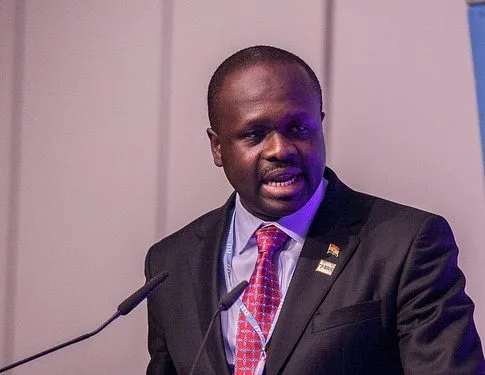Dr. Edward Omane Boamah, Ghana’s Defence Minister, has launched a blistering critique of the former Vice President, Dr. Mahamudu Bawumia, and the Economic Management Team (EMT) he led, holding them responsible for the acute economic hardships faced by ordinary Ghanaians. Dr. Boamah’s strongly worded Facebook post accused the New Patriotic Party (NPP) of prioritizing their political ambitions for the 2026 elections over acknowledging and addressing the dire economic situation they bequeathed to the current administration. He condemned the NPP’s perceived lack of remorse and reflection, arguing that their focus remains solely on regaining power rather than on the well-being of the citizens they were elected to serve. This pointed attack underscores the growing public discontent with the NPP’s economic management, particularly in the aftermath of a severe debt crisis, rampant inflation, and widespread cost-of-living challenges.
Central to Dr. Boamah’s criticism was Dr. Bawumia’s previous assertion that his EMT was a “solid team.” Dr. Boamah used biting sarcasm to dismantle this claim, listing prominent members of the team, including Dr. Osei Akoto, Prof. Gyan Baffour, Dr. Afriyie Akoto, Alan Kyerematen, Boakye Agyarko, Ken Ofori-Atta, and former Senior Minister Yaw Osafo-Maafo. He argued that this “solid team” left behind a legacy of hardship, impacting vulnerable groups such as pensioners, persons with disabilities, women, and youth, and plunging the average Ghanaian into economic despair. This direct challenge to Dr. Bawumia’s competence and the effectiveness of his team serves to highlight the perceived disconnect between the former administration’s pronouncements and the lived realities of many Ghanaians.
The Defence Minister’s accusations paint a picture of an NPP that is out of touch with the struggles of ordinary citizens. He argues that instead of offering sincere apologies for the economic hardship they caused, the party is already focused on campaigning for the next election, a mere six months after leaving office. This perceived lack of accountability and the rapid shift to electioneering, according to Dr. Boamah, demonstrates the NPP’s prioritization of political expediency over genuine concern for the welfare of the Ghanaian people. He emphasizes that Ghanaians deserve better than this self-serving approach to governance, urging a shift in focus towards addressing the pressing economic challenges.
Dr. Boamah’s criticism resonates with a growing chorus of voices expressing concern over the NPP’s handling of the economy. The country’s recent economic woes, including a crippling debt burden, escalating inflation, and a sharp increase in the cost of living, have fuelled public dissatisfaction and calls for accountability. The Defence Minister’s remarks tap into this sentiment, articulating the frustration felt by many who believe that the previous administration’s policies exacerbated these economic challenges. His statement serves as a powerful indictment of the NPP’s economic stewardship, highlighting the perceived gap between their rhetoric and the tangible consequences of their policies.
The Defence Minister concludes his statement with a call for a fundamental transformation, suggesting that Ghana’s current economic trajectory requires a complete reset. He emphasizes that this “alternative” is not just a political slogan but a necessary step towards addressing the deep-seated economic issues facing the nation. This call for a reset underscores the urgency of the situation and the need for a comprehensive and decisive approach to economic recovery. It implies that incremental changes are insufficient to address the scale of the challenges and that a fundamental shift in policy and approach is required.
In essence, Dr. Boamah’s statement represents a scathing critique of the NPP’s economic management, accusing them of leaving behind a legacy of hardship and prioritizing political ambition over the well-being of Ghanaians. His pointed attack on Dr. Bawumia and the EMT, coupled with the call for a fundamental reset, underscores the growing public discontent with the previous administration’s economic policies and the urgent need for a new direction. The statement serves as a rallying cry for accountability and a call for a more citizen-centric approach to economic governance in Ghana.


